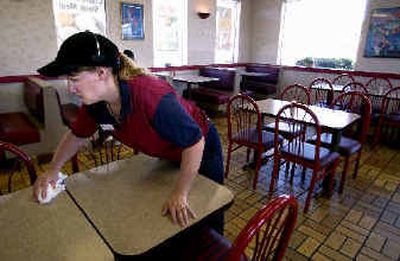Study sheds more light on businesses along couplet

Matt Jankowski doesn’t need a study to know that revenues at his Kentucky Fried Chicken restaurant have dropped, but he has one now anyway.
The Spokane Valley Business Association released a study Wednesday that shows how businesses along the one-way portion of Sprague Avenue have fared since the Sprague-Appleway couplet was built four years ago. Fifty-five percent of business owners there reported a drop in revenues. That decline averaged 27 percent, the study said.
Jankowski once employed 35 people at the 9512 E. Sprague Ave. eatery, but now he needs only 12 workers. Before the couplet was built, when traffic on Sprague Avenue went two ways, he made $20,000 a week. Now, he takes in $10,000, he said.
“If this was my only restaurant, I’d be out of business right now,” said Jankowski, who operates six other KFCs. “I’d like to move, but who’s going to buy the property?”
The business association commissioned the study from Gonzaga University. It hired a student, Evan Marques, to interview business owners and compile the report under the guidance of Scott Bozman, assistant dean of Gonzaga’s School of Business Administration.
Fifty-eight of the 105 business owners interviewed reported a drop in revenues since the couplet was built. Twenty-two businesses, most automobile dealerships or car-related companies, said sales either stayed the same or went up, by 10 percent on average.
Convenience-type establishments such as fast-food restaurants have been hit hardest in recent years, the study says. After all, who wants to pull off westbound Sprague on their way to work in the morning for a pot pie and a tub of mashed potatoes? That’d make more sense on the drive home at night, but restaurants such as KFC aren’t as visible from eastbound Appleway, Jankowski said.
Regardless of business type, the study found that location within the couplet matters. Revenues at businesses on the north side of Sprague are down twice as much as they are on the south side, which is more visible from Appleway. Stores situated near the automobile dealerships benefit from the traffic Auto Row brings to the area.
Audience members at the business association’s meeting Wednesday pointed out one sector left out of the study: businesses that have left Sprague Avenue for Sullivan Road and other locations closer to the Spokane Valley Mall.
“That’s a fact. It happened,” Spokane Valley City Councilman Richard Munson said. “I’m afraid in my mind your report has lost some credibility because you haven’t mentioned that.”
Marques said that wasn’t within the scope of his work. He was hired to quantify the performance of businesses located on Sprague between Fancher and University roads.
The study also didn’t quantify how the sour economy of the past few years has affected businesses and how these companies were performing between the time the Spokane Valley Mall and the couplet were built. Planning Commission Chairman Bill Gothmann said the study shows the businesses’ struggles, but it doesn’t clearly identify a cause.
Marques didn’t interview business owners who’d closed their doors completely since the couplet, and some business owners declined an interview with him if they had moved to Sprague after the couplet was built.
The City Council has commissioned a professional study that will delve into more of those issues. It plans to decide by December what to do with the Sprague-Appleway couplet. The council is considering extending the couplet two miles eastward either as two one-way roads or as a one-way Appleway and a one-way Sprague between University and Thierman and a two-way Sprague east of University.
A separate organization of business people supports extending the couplet eastward, as Spokane County had planned to do eventually when it constructed the existing segment.
But the Spokane Valley Business Association has been vocal about its support for converting Sprague back to two-way traffic between University and Thierman.
“Every single day we cuss that street,” business association Treasurer Dick Behm said.
Sixty-eight percent of the study’s respondents favored converting Sprague back to a two-way road.
Some people at Wednesday’s meeting said the future of the Sprague corridor will depend on whether University City Shopping Center – once the Valley’s main gathering place – is revitalized. The complex is undergoing some renovations now, but some doubted that it will ever play the important role it once did.
Gothmann was optimistic, though, that a lively city center could become reality one day.
“There are ways we can do this, even though it may be on one-way roads,” he said.